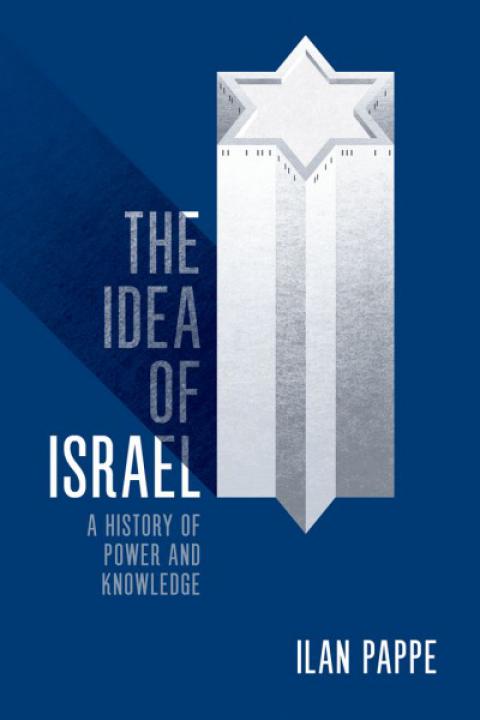The name of Ilan Pappe will be familiar to many readers of Mondoweiss as the Israeli "new historian" and author (among other works) of The Ethnic Cleansing of Palestine who now lives in exile in Britain, where he is on the faculty of the University of Exeter. In this latest book he tells the story of the rise and fall of the intellectual and cultural movement in Israel that came to be known as "post-Zionism" - a story in which he himself played one of the most prominent roles.
The "post-Zionists" were a group of academic and cultural figures - historians, sociologists, anthropologists, economists, journalists, educationalists, writers of fiction, poets, artists, playwrights, makers of artistic and documentary films - who challenged the myths and stereotypes that underlay the Zionist near-consensus of Israel's first few decades. Emerging in the 1980s and early 1990s, the movement acquired impetus in the hopeful atmosphere of the years that followed the Oslo Accords of 1993 only to collapse precipitously at the start of the new millennium.
In terms of substance the book consists of four parts:
Chapters 1--3 analyze the old Zionist consensus, with an emphasis on its defamatory image of the Palestinian and its denial of the Nakba.
Chapter 4 is about the "trailblazers" - the anti-Zionist voices on the fringe of Israeli Jewish society who prepared the way for the later more broadly based challenge. The author talks about people like Maxim Ghilan, Israel Shahak, Boaz Evron, Yeshayahu Leibowitz, and the members of Matzpen (Israeli Socialist Organization). It is a pity that he does not mention the psychologist George R. Tamarin, who was fired from Tel Aviv University in 1963 for his research on the use of the Book of Joshua in the Zionist indoctrination of school students and whose book The Israeli Dilemma: Essays on a Warfare State (Rotterdam University Press, 1973) is full of penetrating insights into the psychology of Zionism.
Chapters 5--10 constitute the core of the book. Here Professor Pappe examines various aspects of the "new thinking" (to borrow an apposite expression from Russia, which has followed a similar trajectory over roughly the same timescale). He focuses on three issues in particular: recognition of the Nakba, criticism of the manipulation of Holocaust memory, and the situation and identity of the Mizrachi or Arab Jews. He comments more briefly on the anti-militarist and feminist dimensions of the new thinking and also describes plays and films that presented a more rounded and empathetic image of Palestinians.
The last two chapters analyze the collapse of the "post-Zionist" movement under increasing pressure from the triumphant "neo-Zionist" forces, with most "post-Zionists" meekly returning to the Zionist fold and others (like Pappe himself) seeking refuge abroad.
Like many others, I have found the term "post-Zionist" somewhat perplexing. It seems to imply that Zionism is already a thing of the past, which is manifestly not the case. The author clarifies this point. While some participants in the movement (including Pappe) were indeed anti-Zionists, others were reluctant to go so far: they sought to "go beyond" Zionism without completely negating its past. It can be argued, however, that by challenging so many of the ideas on which Israel's Zionist society was based they were objectively undermining Zionism and pointing the way toward a non-Zionist future. Their enemies certainly viewed them in that light. They were a "de-Zionizing" movement.
Just how significant were the "post-Zionists"? Professor Pappe admits that they were always very much in the minority, even in academia and the arts. And yet they were not marginal to Israeli Jewish society in the sense that the "trailblazers" had been marginal. At the peak of the movement they numbered in the hundreds and many of them occupied influential positions in various institutions, including the media. Their influence on the society at large was not very great, but they were seen as sufficiently threatening by the Zionist elite to give rise to the current backlash. And they produced a huge body of valuable work that will provide the starting point for the next wave of dissent in their society.
One very important point in the author's argument is his insistence that there has been no return to the earlier Zionist near-consensus in Israel. Instead Zionism has re-emerged in a new form, which he calls "neo-Zionism." In particular, the "neo-Zionists" no longer try to deny that the Nakba took place; rather they defend it as necessary and therefore justified. But I would ask: just how new is this "neo-Zionism"? Is it not the Zionism of what used to be the "extremist" ultra-nationalist fringe, now elevated to the status of a new near-consensus? Is it not a bolder Zionism that dares to say openly what used to be hidden in embarrassed silence?
However that may be, I would like to close by stressing another significant difference between the "old" and the "new" Zionism. The old version could be used to maintain both internal cohesion and a respectable international image for Israel. The new version is capable of performing only the first of these two functions. In today's world no one can hope successfully to defend ethnic cleansing and ethnic supremacy. And indeed Israeli hasbara makes no attempt to do so, merely trying to divert attention from them by means of absurd PR antics like those described by Ilan Pappe in his Epilogue on "Brand Israel 2013."
This is one of the few books that raise our understanding of the overall pattern of political development to a new level. It is not very long or very difficult to read. Please get it.


Spread the word